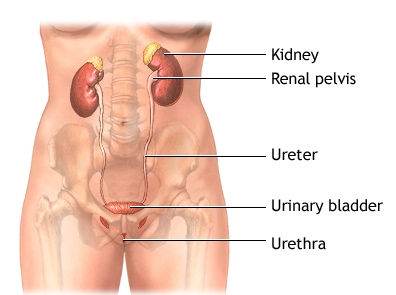Overactive bladder
Overactive bladder is a condition in which the bladder squeezes urine out at the wrong time. You may have overactive bladder if you have two or more of these symptoms:
- You urinate eight or more times a day or two or more times at night
- You have the sudden, strong need to urinate immediately
- You leak urine after a sudden, strong urge to urinate
You also may have incontinence, a loss of bladder control. Nerve problems, too much fluid, or too much caffeine can cause it. Often the cause is unknown.

ANATOMY AND FUNCTION OF BLADDER.
Urine is produced by the kidneys and travels through the ureters to the bladder to be stored. The bladder is a muscular sac that holds urine until it is ready to be released into the urethra, the tube that connects the bladder to the outside of the body. The bladder is emptied when the detrusor muscle, the muscle within the bladder wall, contracts thereby squeezing urine out of the body. At the same time the bladder contracts, the urinary sphincter relaxes. The relaxed sphincter acts like an open door, which allows the urine to pass and exit the body. For successful urination, both the detrusor muscle contraction and sphincter relaxation must occur simultaneously. Nerves in the muscular wall of the bladder release acetylcholine [uh-seet-l-koh-leen], a chemical that attaches to receptors on the muscle cells causing them to contract. Signals from the nerves are sent to the cortex of the brain communicating that it is time to be emptied. This process is primarily autonomic, which is not a voluntary control. Overall, the normal communication between different nerves, muscles, and the brain is very complicated.
Your doctor may prescribe a medicine that can calm muscles and nerves. The medicine may come as a pill, a liquid, or a patch. The medicines can cause your eyes to become dry. They can also cause dry mouth and constipation. To deal with these effects, use eye drops to keep your eyes moist, chew sugarless gum or suck on sugarless hard candy if dry mouth bothers you, and take small sips of water throughout the day.
Source: http://www.nlm.nih.gov/medlineplus/overactivebladder.html

